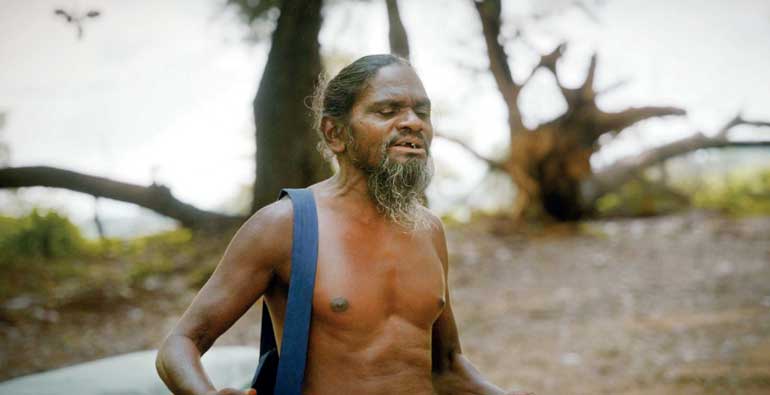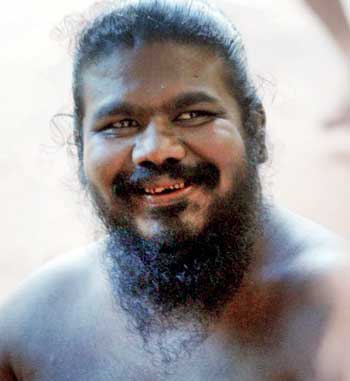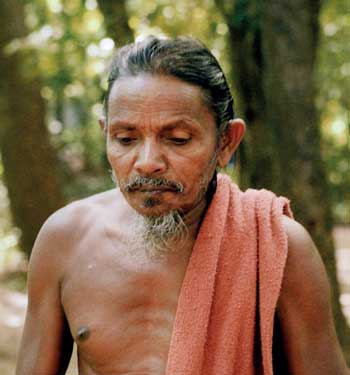Tuesday Feb 24, 2026
Tuesday Feb 24, 2026
Saturday, 10 May 2025 00:00 - - {{hitsCtrl.values.hits}}

A member of the Henanigala Aadi Vasi community gestures while singing an indigenous lullaby
This article marks our second feature this year promoting May as a month commemorating peace and trust; where one uniform manner in memorialising 18 May emerges, celebrating national unity, life and the right to mourn battlefield death of all beings
 |
| Dambana Yakadaya |
 |
| The word peace to the Veddhas is synonymous with earth protection |
By Surya Vishwa
Gune Bandila Aththo and his brother Loku Bandila Aththo are members of the Rathugala-based Veddha community. They are in their early sixties but maintain a youthful visage. They can no longer hunt as their ancestors did in the adjoining wilderness and their children have moved away from the simple lifestyle of the forest. Cast into the monetary theatrics of modernity elders of the Veddha clans across the country have one commonality; being forced, coerced, lured or brainwashed into adopting the commercialisation that has ruined lives of city dwellers.
The Rathugala Aadi Vasi elders and youth like many of their brethren in other territories eke out a living being absorbed into the tourism industry. They perform the ancient rituals and dances as required by those that employ them. This provides these indigenous communities a much needed income and also links them to the flickering memory of how these rituals were once a sacred everyday reality. A reality that enabled them to be an authentic integral part of the eco system in its non-adulterated wholeness.
“They say we are not educated. That we are not civilised. Even our children think this. This is what they are taught in school. As for ourselves our school was the forest and this was so for our parents and grandparents. It is because of what we learnt from the forest that we cannot comprehend the need for killing in order to share the mother that is the earth,” states the Rathugala Veddha community member Guna Bandila.
Vakarai was once an area in the East that was seriously impacted by the civil war. The Rathugala Veddhas although not very close in proximity to the area nevertheless did have a habit of travelling to the fringes of the forestry in the locale for activities such as extracting bees honey.
What did they think of violent conflict breaking out in this country generally considered a paradise? Were they ever caught in the crossfire between the militants or the military? What do they think of the past 16 years that meandered in the aftermath of the conflict? How could the ending of such a saga be commemorated best?
These questions when asked from the indigenous Veddha members from Dambana as well as the Henanigala and Rathugla, elicit the same innocent smiles accompanied by the hapless look of being asked very difficult questions.
Karma of killing a fellow human
They cannot grasp the Karma of killing a fellow human to be able to cohabit the earth. To them the only taking of life that they have been involved in was for survival and concerning only the animals of the wild, following a strict set of hunting rules as taught to them by their forefathers.
When we begin talking to them about the difficult stage the country underwent, the automatic response that is received is non-verbal – a look of guilelessness that one hardly sees in adults in our overcrowded cities. No, they have never faced any situation where they were entangled in the hostilities. The answer we receive is the same whether it is from the Rathugala, Dambana or the Henanigala clan of Aadi Vasis.
“Although we were not affected we know many died and when human beings around us die we feel impacted as well. There is a sorrow that stings us. Therefore we think of the past 16 years as a relief from death and restoring the right to life. We the Veddhas were brought up to consider life as sacred and even when we hunted we did so with this understanding – we never killed for sport – or to inflict suffering. We only killed as needed to survive. Our primary diet is vegetation from the forest and not meat. When we were asked to take to poultry farming so we can rear chicken and kill them for meat we refused. We cannot feed and rear animals only to kill them. We have grown up venerating the earth and to drench this earth with the blood of fellow beings just to share the earth is a sacrilege for us,” says the Dambana based strongman of the Veddha community known as the Dambana Yakadaya.
Whether it is Dambana, Henanigala or Rathugala, their empathy to their city attuned brethren is tied with the common suffering faced by the Veddha community. This is related to the sorrow of being unable to live the life their ancestors were used to, surrounded and inveigled in the sacredness of the forest. They are trapped in the circumstances that modern policies have created just as we in the rest of the country are trapped in the blindness of what development should be. As we have pointed out previously many of them have taken to alcoholism. Many of the indigenous community members are victims of fatal non communicable diseases such as cancer. In Henanigala, where chemical induced farming is carried out by many of the households almost every family has a patient.
“Peace is a word that should not be used to describe the end of armed conflict alone. Peace is a word that should be synonymous with letting people live as per their customs, heritage and without sickness. How can there be peace when people are seriously sick? Are we the Veddha community at peace? We are not. We are not living as we should. We are like fish out of water. All people should be allowed to live according to how they are accustomed to. When this is not done, we believe it results in unhappiness. For us the word conflict is when it is linked to unhappiness. The first conflict begins when it is within the self,” says Dambana Yakadaya.
At a time when words such as peace, reconciliation, justice, unity and oneness spoken in the modern world often sound metallic, for the aborigines of Sri Lanka they are connected to the very foundation of human consciousness the same way the roots of each forest tree was once networked into their lived in awareness.
To create peace we need to think of the forest
“When you ask us about peace, we cannot answer without thinking of the forest. The forest is our mind, our body and our soul. To be at peace or to create peace we need to think of the forest,” points out Uru Warige Loku Bandila Aththo of Henanigala, one of the elder Veddha leaders in that area.
It is imperative at this point to pause and reflect how the mindset of these people who lived so close to nature (until we separated this connection), is different to ours. If we accuse them of being like us and indulge in monetary acts such as charging fees for their performances in a manner of the modern world it is only ourselves we have to blame for making them caricatures of the city.
And when we talk of peace we often articulate it in terms of the city – we often omit the natural parallel the word peace has with the idyllic environs where plant-life thrives in accordance with the decrees of nature; usually called a jungle or woodland or forest.
An example is that the discipline of peacebuilding and peace and conflict studies which are taught in many universities across the world rarely (or never) interweaves with the nature and the need to keep earth resources intact from man’s penchant towards destruction.
Although we may have got it wrong in how we interpret and decode the word ‘peace,’ the Veddhas and aborigines of the world have not. An example is how the Kogi earth protectors from the Sierra Nevada de Santa Marta mountain range in Columbia – the last surviving civilisation from the world of the Inca and Aztec link deforestation and the loss of indigenous plant life with negative neurological influencing that trigger humans disconnected from earth consciousness to behave as non-feeling robots.
“We believe the first unrest begins in the hearts of humans when they cut down forests. We understand that we are not permitted into the forests fearing we will harm it but this is not who we are. So when you talk of commemorating peace we can only recommend that it be done by making all humans closer to the soil, the trees; the entirety and complete diversity of the planet,” says Uru Warige Loku Bandila Aththo.
Commemorating national unity
As we converse further with these humans there are different ideas that come up that could be put to good use for innovating upon and conceptualising a framework that will help promote the month of May as a timeframe that commemorates national unity in a meaningful manner.
Therefore we list below the following recommendations where the protection of the earth, forests, water resource bases and indigenous medicinal plants are combined with promoting a holistic mindset that does not veer towards the diabolical.
FT Key Take